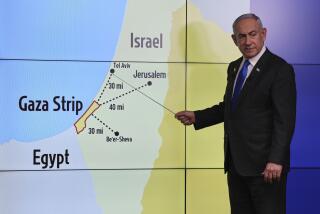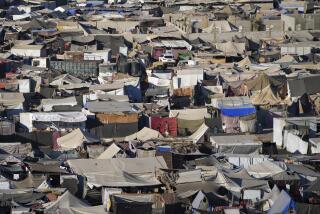Gaza conflict threatens Obama’s plans for Mideast diplomacy
WASHINGTON — The increasingly bloody conflict between Israel and Hamas in the Gaza Strip is threatening the Obama administration’s plans to reinvigorate its Middle East diplomacy, creating new obstacles across the region as the president prepares for his second term.
With negotiators struggling to craft a cease-fire agreement, diplomats and experts say the strife is hampering administration efforts to help resolve the civil war in Syria, improve relations with Egypt’s new government, support moderate Palestinian leaders and check Iran’s growing ambitions.
In a region thrown into turmoil by the “Arab Spring” uprisings, U.S. support for Israel and its right to defend itself has been one of the few constants. That has not changed, despite the well-publicized rocky relationship between President Obama and Israeli Prime Minister Benjamin Netanyahu.
TIMELINE: Israel-Gaza conflict
But by all accounts, the damage to U.S. influence in the region is likely to grow if Israel sends ground troops into Gaza to stop the Hamas militant group from firing rockets into Israel.
“The bottom line is that this will poison everything the United States is trying to do in the region,” said Shadi Hamid, research director at the Brookings Institution’s Doha Center in Qatar.
President Obama has spoken repeatedly with leaders in Israel and Egypt, and Secretary of State Hillary Rodham Clinton has spoken with other officials while she and Obama went ahead with a visit to Thailand, Myanmar and Cambodia that was intended to emphasize the administration’s efforts to refocus U.S. foreign policy on Asia.
Ben Rhodes, the president’s deputy national security advisor, told reporters on the trip that the U.S. position is that “those nations in the region, particularly nations that have influence over Hamas, and that’s principally Egypt and Turkey, also Qatar… that those nations need to use that influence to de-escalate the conflict. And de-escalation has to begin with, again, an end to rocket fire from Gaza.”
U.S. officials don’t have direct contact with Hamas, which they consider a terrorist organization.
Daniel Kurtzer, a former U.S. ambassador to both Israel and Egypt, said the crisis appeared close to a tipping point. If Israel sends armored columns into Gaza, Washington would be caught between pressing Israel to stop a conflict that has Obama’s support, or being seen in the Arab world as complicit in the bloodshed.
“We will be put in the same corner as Israel,” said Kurtzer, now with Princeton University. “This will be an extremely awkward position.”
While U.S. officials have sought to avoid judging Israeli tactics, Obama said at a news conference Sunday in Bangkok, Thailand, that it was preferable for Israel to avoid sending troops into Gaza, for the sake of both Palestinians and Israelis.
Washington has struggled to regain its influence in the Middle East since the Arab Spring uprisings of 2011 brought to power populist Islamist governments that are more wary of Washington and more responsive to pro-Palestinian public opinion.
In the last week, U.S. diplomats have implored Egypt’s president, Mohamed Morsi, to broker a cease-fire between Israel and Hamas. They want to steer Morsi away from taking sides in the conflict and putting at risk the 1979 peace treaty between Israel and Egypt, which Washington views as a linchpin of peace and America’s strategic role in the region. Administration officials have praised Morsi for his efforts and his seeming eagerness to maintain the Camp David treaty.
The administration also faces pressure on Capitol Hill, where key U.S. lawmakers are demanding that Egypt do more to halt the Hamas attacks or risk losing billions of dollars in U.S. military and economic aid.
Sen. Lindsey Graham (R-S.C.), a leading conservative voice on foreign policy, warned Egypt on Sunday to “watch what you do and how you do it.… You’re teetering with the Congress on having your aid cut off if you keep inciting violence between the Israelis and the Palestinians.”
Sen. Carl Levin (D-Mich.), a frequent White House ally who is chairman of the Senate Armed Services Committee, said Egypt’s efforts to resolve the crisis had been “pretty weak so far, from what I can tell.”
U.S. aid is one of the few levers the United States still has to influence Egypt, and administration officials said they would strongly resist efforts to cut it off.
The strife has also created strains in U.S. relations with Turkey. Obama considers the government in Ankara central to administration efforts in Syria and Iran, and he has carefully nurtured ties with Prime Minister Recep Tayyip Erdogan.
Yet Erdogan has denounced Washington for supporting what U.S. officials say are Israel’s efforts to defend itself and to halt rocket attacks from Gaza.
“Israel is the aggressor,” Erdogan told an Islamic group Monday in Istanbul.
On Syria, the United States and its allies have criticized Russia and China for supporting President Bashar Assad’s military crackdown on antigovernment forces. The conflict there has killed an estimated 20,000 civilians.
Hamid said it would appear to people in much of the Islamic world that in Gaza, it’s the U.S. that is enabling the killing of Palestinians. “The Russians and Chinese don’t look like such bad guys anymore.”
Moreover, if the United States appears to be giving Israel unconditional backing in an unpopular conflict, he said, “it becomes harder and harder for Arabs and Turks to stand with the United States.”
The conflict also could ease international pressure on Iran to curb its disputed nuclear program, a top priority for the administration. Iran is a longtime supporter of Hamas, and may gain credibility in some countries for its hostility toward Israel.
The conflict has also threatened America’s moderate Palestinian allies, the Palestinian Authority and its president, Mahmoud Abbas, at least in the short term. Abbas and the Palestinian Authority control the West Bank, while the Hamas movement controls Gaza.
As Arab and other leaders visit Gaza to meet with Hamas leaders, “the message to the Palestinian people is that those who cooperate with Israel don’t get attention and backing, and those who stand up to Israel do,” said Robert Danin, a longtime U.S. diplomat in the Middle East.
The crisis increases pressure on Abbas to seek an enhancement of the status of the Palestinian territories at the United Nations. The United States, Israel and European countries have opposed that effort, saying it will alienate Israel and reduce chances for an Israeli-Palestinian peace deal.
Now ordinary Palestinians will say to moderate leaders, “Hamas has taken action — what have you done?” said Danin, who is now with the Council on Foreign Relations. “This will make it that much harder for Abbas to avoid that course.”
More to Read
Sign up for Essential California
The most important California stories and recommendations in your inbox every morning.
You may occasionally receive promotional content from the Los Angeles Times.










